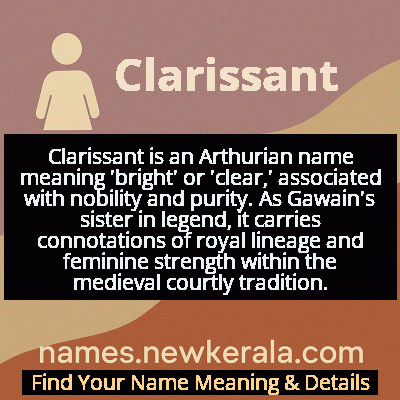Clarissant Name Meaning & Details
Origin, Popularity, Numerology Analysis & Name Meaning of Clarissant
Discover the origin, meaning, and cultural significance of the name CLARISSANT. Delve into its historical roots and explore the lasting impact it has had on communities and traditions.
Name
Clarissant
Gender
Female
Origin
Arthurian
Lucky Number
8
Meaning of the Name - Clarissant
Clarissant is an Arthurian name meaning 'bright' or 'clear,' associated with nobility and purity. As Gawain's sister in legend, it carries connotations of royal lineage and feminine strength within the medieval courtly tradition.
Clarissant - Complete Numerology Analysis
Your Numerology Number
Based on Pythagorean Numerology System
Ruling Planet
Saturn
Positive Nature
Ambitious, efficient, realistic, and authoritative.
Negative Traits
Materialistic, stressed, confrontational, and can be overly ambitious.
Lucky Colours
Dark blue, black.
Lucky Days
Saturday.
Lucky Stones
Blue sapphire, amethyst.
Harmony Numbers
2, 4, 6.
Best Suited Professions
Business leaders, managers, financial services, law enforcement.
What People Like About You
Leadership, determination, organizational skills.
Famous People Named Clarissant
Clarissant of Orkney
Arthurian Noblewoman
Sister of Sir Gawain and mother of Guinglain in Arthurian romance
Clarissant le Fey
Literary Character
Modern reinterpretation as a sorceress in contemporary Arthurian fiction
Clarissant of Cornwall
Mythological Figure
Appears in Post-Vulgate Cycle as a noblewoman connected to the Grail quest
Name Variations & International Equivalents
Click on blue names to explore their detailed meanings. Gray names with will be available soon.
Cultural & Historical Significance
Her character serves as a bridge between the heroic masculine world of knighthood and the more subtle feminine influences that often drove the narrative forward in Arthurian tales. While less prominent than characters like Guinevere or Morgan le Fay, Clarissant's presence highlights the importance of women in maintaining dynastic lines and courtly relationships. Her portrayal varies across texts, sometimes appearing as a victim of circumstance and other times as an active participant in the complex political machinations of Camelot, reflecting the evolving role of women in medieval literature and society.
Extended Personality Analysis
Characters named Clarissant in Arthurian tradition typically exhibit a blend of noble dignity, emotional depth, and familial loyalty. As a sister to one of Arthur's greatest knights, she often demonstrates the refined courtly manners expected of high-born women in medieval romance, combined with a strong sense of family obligation. Her personality is frequently portrayed as compassionate and nurturing, yet tempered by the political awareness necessary for survival in the treacherous world of Arthurian politics. She embodies the ideal of medieval womanhood—graceful, discreet, and devoted to her family's honor.
In various literary portrayals, Clarissant shows remarkable resilience in the face of the conflicts that plague her family, particularly the tensions between her brothers and their various rivalries. She often serves as a peacemaker or mediator figure, using her diplomatic skills to navigate the complex relationships within the Orkney clan. Her character development across different texts reveals a woman who, while operating within the constraints of her society, maintains her own agency and moral compass. The name suggests someone who balances traditional feminine virtues with inner strength and perceptiveness about human nature.
Modern Usage & Popularity
In contemporary times, Clarissant remains an extremely rare name, primarily used by Arthurian enthusiasts, historical fiction authors, and parents seeking unique names with literary heritage. Its usage is almost exclusively confined to English-speaking countries with strong Arthurian traditions, particularly Britain and the United States. The name has never appeared in official baby name statistics, indicating its status as a truly uncommon choice. However, it has seen minor resurgence in recent years as part of the broader trend toward mythological and literary names, often chosen by parents who appreciate its connection to Arthurian legend and its elegant, feminine sound. Modern bearers of the name typically encounter frequent explanations of its origin and pronunciation.
Symbolic & Spiritual Meanings
Symbolically, Clarissant represents the often-overlooked feminine presence in heroic narratives, serving as a reminder that behind every great knight stood women who shaped their destinies. The name carries connotations of clarity and brightness (from its Latin root 'clarus'), suggesting both intellectual and moral illumination. In the context of Arthurian symbolism, she embodies the tension between family loyalty and individual morality that characterizes much of the Grail quest narratives. Her character often symbolizes the domestic and political spheres that both supported and complicated the chivalric ideals of Camelot, representing the quiet strength that maintains courtly society while the knights pursue their glorious adventures.

